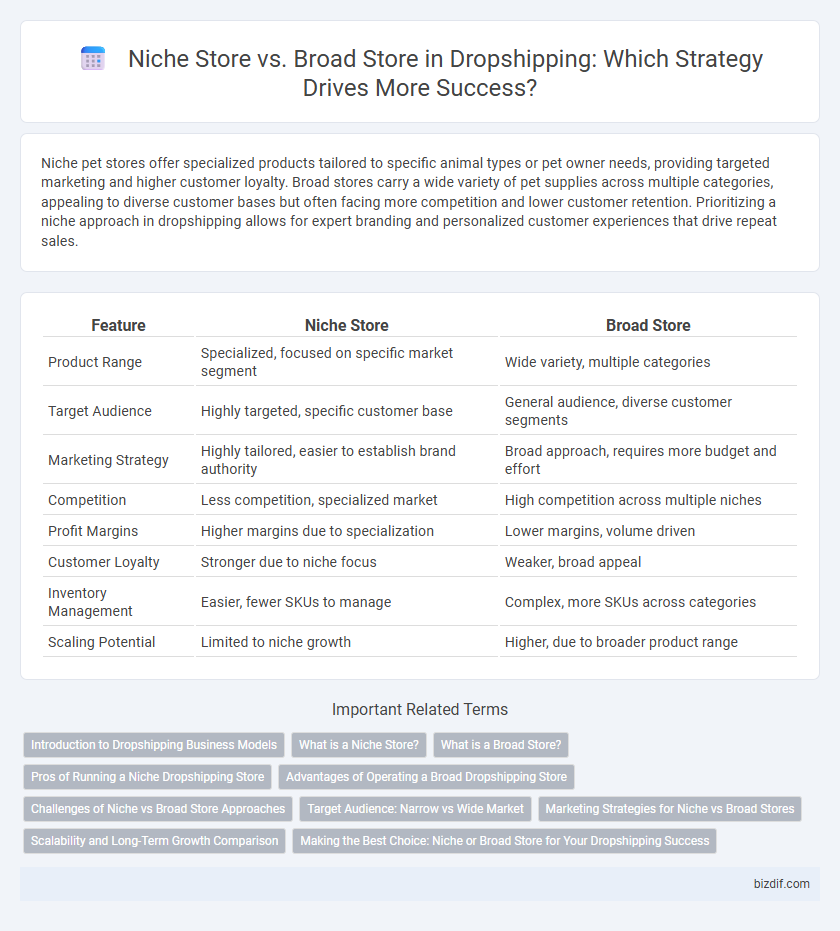Niche pet stores offer specialized products tailored to specific animal types or pet owner needs, providing targeted marketing and higher customer loyalty. Broad stores carry a wide variety of pet supplies across multiple categories, appealing to diverse customer bases but often facing more competition and lower customer retention. Prioritizing a niche approach in dropshipping allows for expert branding and personalized customer experiences that drive repeat sales.
Table of Comparison
| Feature | Niche Store | Broad Store |
|---|---|---|
| Product Range | Specialized, focused on specific market segment | Wide variety, multiple categories |
| Target Audience | Highly targeted, specific customer base | General audience, diverse customer segments |
| Marketing Strategy | Highly tailored, easier to establish brand authority | Broad approach, requires more budget and effort |
| Competition | Less competition, specialized market | High competition across multiple niches |
| Profit Margins | Higher margins due to specialization | Lower margins, volume driven |
| Customer Loyalty | Stronger due to niche focus | Weaker, broad appeal |
| Inventory Management | Easier, fewer SKUs to manage | Complex, more SKUs across categories |
| Scaling Potential | Limited to niche growth | Higher, due to broader product range |
Introduction to Dropshipping Business Models
Niche stores in dropshipping focus on a specific product category, allowing targeted marketing and higher customer engagement due to specialized offerings. Broad stores carry a wide range of products across multiple categories, attracting diverse customer segments but requiring more extensive inventory management and marketing strategies. Understanding the differences between niche and broad stores helps entrepreneurs choose the right business model to optimize profit margins and streamline operations.
What is a Niche Store?
A niche store specializes in a specific product category or target audience, allowing for focused marketing and customer engagement. By offering a curated selection of items tailored to particular interests or needs, niche stores can build brand loyalty and reduce competition. This targeted approach improves conversion rates and attracts shoppers seeking specialized products within dropshipping business models.
What is a Broad Store?
A Broad Store in dropshipping offers a wide variety of products across multiple categories, targeting a larger audience compared to niche stores. This approach allows for diverse inventory, increasing the chances of attracting different customer segments and maximizing sales opportunities. Managing a broad store requires effective organization and marketing strategies to handle varied product lines efficiently.
Pros of Running a Niche Dropshipping Store
Running a niche dropshipping store allows for targeted marketing efforts, resulting in higher conversion rates and more efficient ad spend. Specializing in a specific product category enhances brand authority and customer trust, which fosters repeat purchases and word-of-mouth referrals. Additionally, niche stores face less competition, enabling easier market penetration and optimized inventory management.
Advantages of Operating a Broad Dropshipping Store
Operating a broad dropshipping store allows sellers to target multiple market segments simultaneously, increasing potential customer reach and revenue streams. With diverse product offerings, broad stores can quickly adapt to market trends and reduce dependency on a single niche, enhancing business stability. This approach also facilitates cross-selling opportunities, improving average order value and overall profitability.
Challenges of Niche vs Broad Store Approaches
Niche stores face challenges such as limited market size and higher reliance on targeted marketing to attract a specific audience, which can restrict scalability. Broad stores struggle with inventory management complexity and diluted branding, making it harder to establish customer loyalty and optimize advertising campaigns for diverse product categories. Balancing product selection and marketing strategies is crucial to overcoming the operational difficulties inherent in both niche and broad dropshipping models.
Target Audience: Narrow vs Wide Market
Niche stores in dropshipping cater to a specific target audience by focusing on a narrow market segment with specialized products, enabling tailored marketing strategies and higher customer engagement. Broad stores aim for a wide market by offering a diverse range of products to attract various customer groups, prioritizing volume and variety over personalization. Choosing between niche and broad stores depends on business goals, whether prioritizing in-depth customer connection or extensive market reach.
Marketing Strategies for Niche vs Broad Stores
Niche stores focus marketing efforts on targeted audiences with specific interests, utilizing precise keywords, tailored content, and specialized social media campaigns to increase conversion rates. Broad stores implement diverse marketing strategies across multiple channels to reach a wide audience, often relying on general ads and broad keyword targeting to drive traffic. Effective marketing for niche stores leverages customer personas and high engagement tactics, while broad stores emphasize brand awareness and volume-based promotions.
Scalability and Long-Term Growth Comparison
Niche stores offer targeted products that attract a specific audience, resulting in higher conversion rates and better customer loyalty, which supports sustainable long-term growth. Broad stores provide a wide range of products that can capture a larger market but often face challenges in brand identity and customer retention, impacting scalability. For long-term success, niche stores typically enable more efficient marketing efforts and scalable inventory management compared to broad stores.
Making the Best Choice: Niche or Broad Store for Your Dropshipping Success
Selecting between a niche store and a broad store is crucial for dropshipping success, as niche stores target specific customer segments with tailored products, increasing conversion rates and brand loyalty. Broad stores offer a wide range of products, attracting diverse audiences but often face challenges in marketing and inventory management. Evaluating market trends, competition, and customer preferences helps determine the optimal store model to maximize profitability and scalability in the dropshipping business.
Niche Store vs Broad Store Infographic

 bizdif.com
bizdif.com